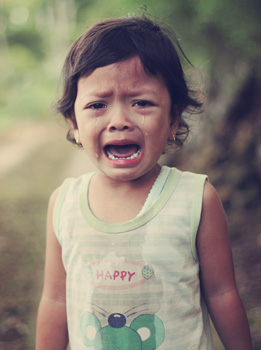Helping kids with big emotions
© Sue Bradshaw for Auckland Therapy Blog, 4 June 2020
Help kids learn to cope
Strong emotions are difficult for all of us to cope with
 Big
feelings may include the pain of loss or regret, or fury at a perceived or
actual slight or injustice, or fear that something bad is going to
happen and we may not be able to cope. Children aren't
born able to manage these strong feelings, and rely on us to help them
learn how to weather these storms.
Big
feelings may include the pain of loss or regret, or fury at a perceived or
actual slight or injustice, or fear that something bad is going to
happen and we may not be able to cope. Children aren't
born able to manage these strong feelings, and rely on us to help them
learn how to weather these storms.
Being emotional availability
When children are feeling big feelings it helps them to know they don't have to deal with these all on their own. They need to know that what they are feeling is acceptable and that they won't be deserted or punished for feeling sad, angry, scared or any other strong emotional response.
Sad kids
If they are sad they need to be able to show that they are sad. Some children may cry, others may become very quiet, while others will seek physical contact and reassurance. It is important not to give messages such as "don't be like that" or "cheer up" as these tell a child that feeling the loss of something or someone is unacceptable. Sadness, like other strong feelings is a normal part of life.
Angry kids
Being emotionally available to an angry child is equally important but can be a challenge, especially if anger triggers strong emotions within you based on your own past experiences. Children who are angry can be either frightening or annoying to adults, leading adults to either withdraw from the child or respond with their own anger. Both adult anger and adult withdrawal can frighten a child and escalate their angry response.
Frightened kids
Frightened children need you to help them feel safe. A calm, non-judgmental presence is helpful. While challenges are important in life, a child flooded with fear learns nothing and will become more reticent to push themselves beyond their comfort zone in the future.
Don't make them manage by themselves
If children are forced to manage these feelings on their own, the feelings are likely to morph into behaviours such as whining, hitting out at other children, or withdrawing.
General guidelines
General guidelines for helping your child with their feelings include:
- Don't add fuel to the fire - maintaining your composure
- Use less words - children can't hear well when stressed
- Keep messages brief
- Tone is more important
- If you have been pushed away when they were distressed, reconnect once your child is calm
- Finally keep to the golden rule
- Listen first, guide behaviour later
- Children will be more receptive to your guidance if they feel understood and are given time to calm before you help them work out how to manage next time
Getting help
My focus is helping families and individuals find a way through difficult times. This may be a short term intervention of 1 to 4 appointments or longer. I am providing a mix of online and in person consultations and therapy for children, teenagers and adults.
Find a Therapist
 Sue
Bradshaw (Albany) is part of our Citywide team of registered therapists. For more information or to arrange an appointment please contact
Sue or any member of the team.
Sue
Bradshaw (Albany) is part of our Citywide team of registered therapists. For more information or to arrange an appointment please contact
Sue or any member of the team.
Auckland Therapy
Auckland Therapy is an experienced group of registered psychotherapists offering counselling and psychotherapy services citywide in Auckland. Find an Auckland Therapist by suburb or learn more about the Services we offer or Issues with work with.
Follow us on Facebook or see more of our Blog posts.
